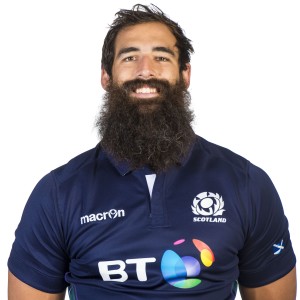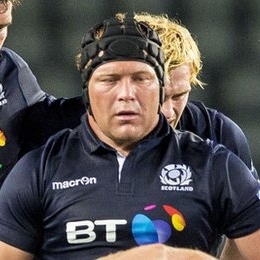
Josh Strauss

WP Nel
You would think after years of repeated and soul-destroying failure in the Six Nations, those with an affection for the Scotland team would be looking at the upcoming Rugby World Cup with some trepidation.
Some do fear that a 2nd successive group stage exit is a distinct possibility but others will tell you that this tournament represents an opportunity for an emerging squad to spring some shocks on the rugby elite.
Scotland begin their campaign against Japan at Kingsholm on 23 September before facing the USA and 2-time champions South Africa ahead of the final – and potentially decisive – pool match against Samoa.
3 Former Scotland internationals were asked to assess how Scotland will fare in the World Cup.
- Chris Paterson ( CP ) is Scotland’s record cap holder and played in 4 World Cups from 1999 through to 2007.
- Peter Wright ( PW ) won 21 caps for Scotland, played at the 1995 World Cup and was selected for the 1993 British & Irish Lions tour to New Zealand.
- John Beattie ( JB ) appeared 25 times for Scotland, was part of the 1984 Grand Slam winning squad and toured twice with the British & Irish Lions.
Squad balance:
The squad Vern Cotter named for the tournament was pretty much as expected, with only a couple of selections sparking serious debate.
The main talking point was the inclusion of John Hardie – the back row forward who arrived from New Zealand without so much as a club fixed up before he was parachuted into the squad – while John Barclay, a veteran of 2 World Cups and 43 Scotland caps, missed out.
So is this squad equipped to have a successful World Cup?
CP: “I think it’s an exciting squad. I think in order to be successful at tournaments you have to be able to play more than 1 style.
“With the different opposition you’ll play more than 1 type of rugby and I think this squad allows Vern to do that.”
PW: “The front 5 and the backs are pretty decent, but the back-row is the 1 that surprised me. When I look at it, the balance doesn’t look great.
“I think we’ve got a very strong potential starting 15, I just worry in the forwards if we’ve got guys on the bench that can change the game against Samoa or even America.”
JB: “He’s trying to pick a squad of fundamentally big forwards and attacking backs.
“He’s been very brave, he’s done away with tradition. He’s brought in Hardie who we had never really heard of until very recently, so he’s picked players he thinks can do a job no matter where they were born.”
Scars from a Six Nations whitewash:
After an encouraging Autumn Test series in 2014 , many felt Scotland under Cotter were ready to shake things up in 2015 and, if not quite win the title, at least have a major say in who did.
Fast-forward a few weeks and Scotland had been on the wrong end of 5-straight defeats, including a final-day hammering at home to Ireland . The Wooden Spoon did nothing to stir Scottish souls in World Cup year.
So are the scars of a Six Nations whitewash still raw, or have the bad memories been consigned to history?
CP: “I think they’ll have learned from it undoubtedly, because it is quite a young group, but it’ll be towards the back of their minds because there has been so much rugby played since then.
“In club rugby Glasgow went on to win the championship as we know and Edinburgh went on to compete in the final of the European Challenge Cup , and that was all before the World Cup preparation and games. So there’s been a lot of time and a lot of rugby time past since then, but they’ll learn certainly from the Irish game.”
PW: “The 1 worry with the players at international level is they don’t know how to win tight games, and there’s every chance there’s going to be tight games in this tournament. Some of the Glasgow guys have experience of winning which is great and will help, but it’s that winning in the blue jersey that a lot of the guys lack.
“It was a great warm-up win at home to Italy, and if we go in with that attitude, play with that adventure, with that tempo then I think we’ve got a great chance.”
JB: “Scotland were still on their way to being organised (during the Six Nations). In the World Cup warm-up games you can see there’s a lot more organisation.
“If I was in that squad I’d be a little bit happy thinking we might just come under the radar. Nobody expects anything of Scotland but we’re organised and fit for the 1st time.”
What would be a successful World Cup:
The high watermark for Scotland in the World Cup came in 1991, when a glaring Gavin Hastings penalty miss contributed to a 9 / 6 semi-final defeat to England at Murrayfield.
At the 2011 tournament Andy Robinson’s side became the 1st Scotland team to be eliminated at the pool stage, following defeats to Argentina and England .
So what is a realistic aim this time around?
JB: “1st Success is getting out the pool. 2nd Success is getting past the quarter-finals, which would be extraordinary given where we are.
“There are measures of success for this team and the main one would be can they get by the quarter-finals. That would be an astonishing success.”
PW: “Getting into the quarter-finals and having a crack at either England, Australia, Wales or Fiji, I think that would constitute success.
“If we get to that knockout stage, if Scotland have still got all their top players available, I think whoever we get will be worried about us. Not getting out the group for the 2nd World Cup in a row would be a complete and utter failure in my opinion.”
CP: “Scotland, if they play to their potential, have the ability to get out the group, but it’s hard. There will be upsets along the way.”
Scotland’s key man:
JB: Willem ‘WP’ Nel – “Where Scotland fall down, where we’ve always come off 2nd best for the past 30 years is in set-piece. If you have a tighthead prop who can hold your side of the scrum up, then you have won a watch. If he plays well the team plays well. He could be the man.”
PW: Josh Strauss – “If Strauss fronts up and performs at international level the way he can do at club level, I think he could be the guy to take Scotland into the quarter-finals. He’s robust, very physical, a good ball-carrier.”
CP: Finn Russell – “Previous World Cups haven’t involved a lot of rugby. If it follows the trend then I think decision-making is the ultimate, and you can’t look any further than your halfbacks for decision-making purposes. Whoever is in that No 9 – 10 axis will be making the big decisions.”
bbc